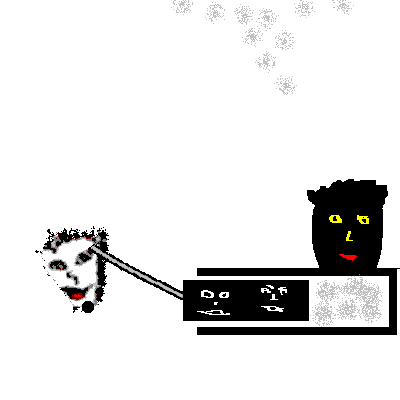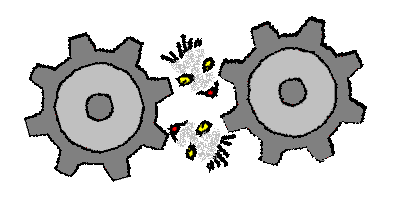On the title
of the book, page 7:
The Title of this book has been chosen to make plain
to my readers and also to keep before myself the fact
that it is an attempt at an objective description of
human behaviour. A purely objective description is not
yet possible; the showman cannot help being part of the
show...On the practical
value for doctors, page 7:
It is a plea for many different things, but especially
for the physiological, material attitude of patients and
doctors towards life and its discomforts and for the
exclusion of magic and the supernatural from the
treatment of the human machine.
On making people sick, page 9:
It is fatally easy to turn a sick person into a very
sick person by increasing his anxiety...
On the volatility of
gods, page 12:
Only as the gods become less and less personal, and
finally evaporate, does the objective viewpoint become
possible.
On the scientific creed of causality,
page 12:
The logical system based on this objective approach
is science. It is not teleological like religion. It is
not an enquirey into purposes, but into causes.
On causality, page 13:
...effects follow causes and depend entirely upon them...
On the literary style fit for science,
page 14:
Science must be written in prose, in objective
language, and its literature will ultimately be a
collection of formulae and statistics.
On psychology not being measurable,
page 15:
...so the egocentric, subjective physiology and
psychology are still taught, and their concepts still
accepted, being more easily understood, though it is now
realised that the subjective attitude cannot be
scientific; the results of its experiments cannot be
measured.
On the need and inability to be
objective always, page 17:
But I will try whenever possible to be objective, and
I ask my readers to be objective too, and to feel that
they are on firmer ground when they are standing outside
the subject, viewing it as dispassionately as possible.
The only thing which our brains cannot view objectively
or experiment with, therefore possibly the only
absolutely unknowable thing, is the working of our own
brains.
On the classical of motion as the only
cause, page 17:
...as we cannot conceive any movements except as the
product and resultant of other movements...
On the soul being a semi-scientific
concept, page 17:
Lately, with the growth of a semi-educated public,
with but lightly disciplined modes of thought and brought
up with a reverence for the word-made-flesh, there have
developed many animistic philosophies, expressed and
propagated by an enormous semi-scientific literature,
into which the concept "soul" has crept back.
A bold assumption not yet proven, page
18:
Psychoanalysts "explain" behaviour by
saying that it is motivated and controlled by various
urges and repressions which they have exalted into
spiritual entities - the Libido, the Censor. They are
apparently content with having done this. They do not
enquire further. If they did, they would find nothing but
the structure of the organism and its responses to its
environment.
On the volatility of free will, page
19:
The more is learnt about the physiology of any
action, the less it is seen to depend upon
"Will".
The soul is being driven out of
reality, page 19:
The search for the possible seat of the soul is
drawing to an end in the same way as did the search for
the earthly paradise. With every new discovery we find
places where it is not.
On duality being unacceptable, page 20:
Except for the pure idealist, belief in Free Will
necessitates a belief in a duality, a belief in what can
be called material and what can be called immaterial. It
also involves the belief that these can affect each
other. Whatever his conception of matter, whether in
terms of wave or particle, a scientist cannot conceive it
as being affected - that is, its motion as being
initiated, stopped or deflected - by something other than
matter. Such an occurrence would be in the class of
miracles, and on a level with that which Joshua performed
in causing the sun to stand still; in fact it would be
even more miraculous, because Joshua was not immaterial
and he did exert some material force; he spoke to the sun.
On the pillars of science, page 21:
...though science has been built upon determinismis,
religion, politics and law are based on Free Will.
After the introduction to the book,
there follow a number of chapters where physiological and
psychological phenomena are described in terms of a
purely materialist-behaviouristic language.
 contact contact
Last edited: January 2002
|
|
In general, the assertions made in the introduction
of this book have almost all been challenged by the
findings of quantum physics. Quantum physics
was established during the 1920ies and 1930ies. Quotations from modern scientists seriously
questioning the ubiquious validity of causality are given
by the following links:
 Tor Norretranders Tor Norretranders
 Henry Stapp Henry Stapp
 Teilhard de Chardin Teilhard de Chardin
 John Eccles John Eccles
 Karl Popper Karl Popper
 Kepler`s
laws of planetary motion: a seemingly perfect
example of the validity of mechanistic determinism Kepler`s
laws of planetary motion: a seemingly perfect
example of the validity of mechanistic determinism

Another example of a
deterministic view of the world: ballistics

Do humans function like other pieces of
machinery?
 Aldous Huxlex, a contemporary
of Yerbury Dent, thought quite differently. Huxley
attaches great importances the mystic strangeness of the
inner world of fancy and imagination. Aldous Huxlex, a contemporary
of Yerbury Dent, thought quite differently. Huxley
attaches great importances the mystic strangeness of the
inner world of fancy and imagination.
|




